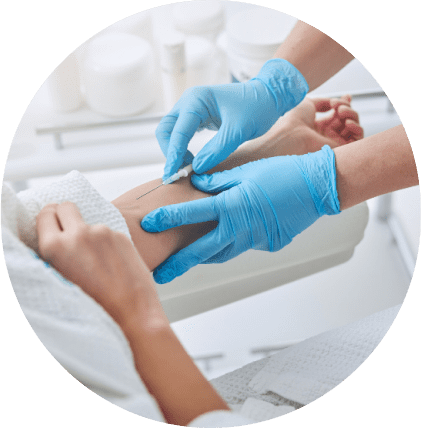
Infusion Therapy is known as IV therapy involves administering medications intravenously.
This is done by inserting a needle or catheter directly into the patient’s arm or a subcutaneous port; usually in the patient’s chest. It allows for much more efficient treatment of acute and chronic illnesses since it delivers medicine, antibiotics, and/or hydration directly into the bloodstream versus oral medication therapy.
Specialty and Infusion pharmacies offer medications and special therapy support not found in a traditional retail pharmacy. While it is true that most people don’t generally need the medications or focused service of a specialty pharmacy, they serve an important role in the continuum of care for several different areas of health. Most specialty pharmacies operate as closed door facilities that do not offer the basic over the counter medications people associate with a drug store. Even more unique, these providers seldom have the common medications prescribed by your family physician. However, when a patient is experiencing a complex health condition, specialty and infusion pharmacies can offer options inside the patient’s home, where skilled professionals are needed, but the full resources of a hospital are not necessary. Of course, this is an important decision between you and your doctor based on your personal health condition and their expert analysis of your overall health situation is crucial.
A wide array of health conditions could be candidates for the services of a specialty and infusion medication provider. Chronic, lifelong conditions like hemophilia, compromised immune systems, iron deficiency, and poor nutrient absorption are just a few. Simpler conditions such as IV antibiotics and hydration can also sometimes be continued at the home after leaving a hospital. When more clinical care is needed, but a full facility is not necessary, this pharmacy category fills the gap. Thousands of people across the world are discovering that they can have freedom and normalcy in their life even if they receive medication through IV ports with nursing support, or through self-infusion.
You need to educate yourself about your condition and most importantly ask your prescribing doctor whether the services of a specialty and infusion pharmacy would fit your situation. If it is decided there is a possibility for services in the home or if the medication could be self-administered, but requires focused pharmacy monitoring and physician reporting, you will need to select a reputable medication provider. If you have a condition where you think you may benefit from this type of pharmacy in the coming years, make sure to select insurance coverages that provide you the greatest amount of choice in your care. Price is always a consideration, but it should never be the only factor when making a decision. After all it’s your health, you should have a say in how you protect it. Choose a specialty and infusion pharmacy that fits you. Ask where your medication will be dispensed. If required, ask whether you will be seen by the same nurse each time a visit is needed. Verify response time if you encounter an issue with your medications. Ask to speak directly with a pharmacist before starting service. Ensure your pharmacy gives you a clear understanding of your insurance obligations before beginning treatment. Make sure your specialty pharmacy will communicate with your physician frequently about your progress and any changes in drug regimen. In home services are still forging their way into the medical arena. Some payers (insurances) will refuse to allow in home service, opting for a more expensive hospital stay. However, there is striking evidence of savings and quality of healing when a patient is allowed to care for their conditions in the comfort of familiar surroundings. It is expected that more and more care will be directed toward in home healing as the world struggles to make healthcare affordable and safe.

